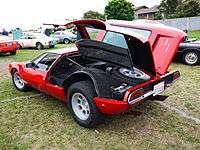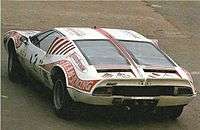De Tomaso Mangusta
| De Tomaso Mangusta | |
|---|---|
 | |
| Overview | |
| Manufacturer | De Tomaso |
| Production | 1967–1971 (401 produced) |
| Designer | Giorgetto Giugiaro at Ghia |
| Body and chassis | |
| Class | Sports car |
| Body style | 2-door coupe |
| Layout | RMR layout |
| Powertrain | |
| Engine |
4.7-litre (4728 cc/289 cid) V8 5.0-litre (4949 cc/302 cid) V8 |
| Transmission | ZF 5-speed manual |
| Dimensions | |
| Wheelbase | 2,500 mm (98.4 in)[1] |
| Length | 4,275 mm (168.3 in)[1] |
| Width | 1,834 mm (72.2 in)[1] |
| Height | 1,100 mm (43.3 in)[1] |
| Curb weight | 1,322 kg (2,914.5 lb)[1] |
| Chronology | |
| Predecessor | De Tomaso Vallelunga |
| Successor | De Tomaso Pantera |
The De Tomaso Mangusta is a sports car produced by Italian automobile manufacturer De Tomaso produced between 1967 and 1971.
History
The Mangusta replaced the Vallelunga model, on which its chassis was based.[2] The word "mangusta" is Italian for "mongoose", an animal that can kill cobras. It was rumored that the car was so named because De Tomaso had some talks with Carroll Shelby to replace the Shelby Cobra with a racing car to be built in Italy by the Argentine-born De Tomaso ("De Tomaso Sport 5000" a.k.a. "De Tomaso P70"),[3] but no deal was signed since Shelby became involved in the Ford GT40 racing program. Nevertheless, Alejandro de Tomaso and Carroll Shelby were friends and business is business, so it is also rumored that the first handful of engines for the Mangusta may have come from Shelby. The Mangusta was replaced by the much cheaper-to-build De Tomaso Pantera in 1971.
401 Mangustas were built, about 150 of the European version, the remainder were the North American version. The initial cars are claimed to have a more powerful Ford HiPo 289 cu. in. engine; the later cars all had Ford 302 engines. With the 1970 model USA destined cars were produced with 2 headlamp pop-up, an estimated 50 cars were produced in this configuration. One car was built with a Chevrolet engine for General Motors-Vice President, Bill Mitchell.[4] There are reported to be approximately 250 of the 401 cars left in existence, according to the three available registries.
Specifications
Originally fitted with Ford 289 V8 engine mid-mounted 306 horsepower (228 kW) (EU version), in the North American market the Mangusta was introduced with a Ford 302 V8 engine 221 horsepower (165 kW), driving through a 5-speed ZF transaxle. Giorgetto Giugiaro designed the car, which is easily recognised by its gull wing doors over the engine and luggage compartment. All round disc brakes and independent suspension, rack & pinion steering, air conditioning, and power windows, were ahead of other manufacturers of the time. Journalist Paul Frère claimed he achieved a top speed of 250 km/h (155 mph).[2]
The Mangusta was relatively inexpensive for the time but, with a 32/68 weight distribution and a less than solid chassis, suffered from stability problems and poor handling. The car was also cramped and had extremely low ground clearance.[2]
Revival
The Mangusta name was revived in the early 2000s when the concept car De Tomaso Biguà became the Qvale Mangusta, after a dispute between De Tomaso and business partner Qvale. The Qvale sold only in limited numbers.
-

Rear view of De Tomaso Mangusta, showing gull wing doors over the engine and luggage compartment
-
De Tomaso Mangusta Group 4 GT
-

References
- 1 2 3 4 5 "1967 De Tomaso Mangusta Technical specifications". http://www.carfolio.com. Archived from the original on 2013-02-28. Retrieved 2013-09-30. External link in
|work=(help) - 1 2 3 Lawrence, Mike (1997). A to Z of Sports Cars 1945-1990. Bay View Books Ltd. ISBN 1-870979-81-8
- ↑ "De Tomaso 70P / Sport 5000 « QV500". Web.archive.org. Retrieved 2012-04-14.
- ↑ "De Tomaso Mangusta Speciale « QV500". Web.archive.org. 2011-07-05. Retrieved 2012-04-14.
External links
- Pictures of a 1969 De Tomaso Mangusta
- The PROVAMO registry of De Tomaso Automobiles
- The Mangusta International Mangusta Registry
- The QV500 Registry of De Tomaso Automobiles
- A small De Tomaso registry in Excel format that can be downloaded. Includes a page dedicated to the Mangusta
| De Tomaso Modena S.p.A. car timeline, 1960s–2010s | ||||||||||||||||||||||||||||||||||||||||||||||||||
|---|---|---|---|---|---|---|---|---|---|---|---|---|---|---|---|---|---|---|---|---|---|---|---|---|---|---|---|---|---|---|---|---|---|---|---|---|---|---|---|---|---|---|---|---|---|---|---|---|---|---|
| Type | 1960s | 1970s | 1980s | 1990s | 2000s | |||||||||||||||||||||||||||||||||||||||||||||
| 0 | 1 | 2 | 3 | 4 | 5 | 6 | 7 | 8 | 9 | 0 | 1 | 2 | 3 | 4 | 5 | 6 | 7 | 8 | 9 | 0 | 1 | 2 | 3 | 4 | 5 | 6 | 7 | 8 | 9 | 0 | 1 | 2 | 3 | 4 | 5 | 6 | 7 | 8 | 9 | 0 | 1 | 2 | 3 | 4 | 5 | 6 | 7 | 8 | 9 | |
| RMR | Vallelunga | Mangusta | Pantera | Guarà | ||||||||||||||||||||||||||||||||||||||||||||||
| FR Sedan | Deauville | |||||||||||||||||||||||||||||||||||||||||||||||||
| FR Coupé | Longchamp | Biguà | ||||||||||||||||||||||||||||||||||||||||||||||||